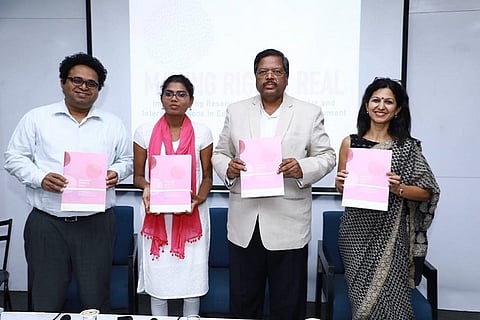

The Transgender Persons (Protection of Rights) Bill was hastily passed in the Lok Sabha on December 17 and has since been termed as a “black day” for the community. One of the major things that were ignored in the Bill was to extend reservations to trans people and intersex persons, as was directed by the Supreme Court in NALSA v Union of India in 2014. However, this is a demand that has since been ignored.
In order to take the first step to address the problem of implementing reservation for transgender and intersex persons in education and public employment, the Centre for Law and Policy Research (CLPR) released a policy brief. The event, organised by CLPR, held a panel discussion by Senior Advocate and Executive Director of CLPR Jayna Kothari; Director of the Trans Rights Now Collective Grace Banu; and Assistant Professor of Law at National Law University, Delhi, Dr Anup Surendranath.
As per the NALSA judgement, State and Central governments were asked to extend reservations to trans people and intersex in education and public employment and directed Centre and State Governments to take steps to treat them as socially and educationally backward classes.
The recommendation
Definition — As per the policy brief, the first is to define who a transgender person is, who an intersex person is. In the Indian context, the definition of intersex is not clear. In order to understand who the beneficiaries of a reservation policy would be, the first step would be to define the terms properly. In India, intersex persons have been included under the term ‘transgender’.
Self-identification — The right to self-identification is also laid down in the NALSA judgement, but it offers no protocol. Trans persons must be able to self-identify irrespective of whether someone has undergone a medical procedure (as has been laid down in the NALSA judgement), and there must be no requirement of a mental health assessment, and no mandatory medical diagnosis for gender recognition.
The bill passed by the Lok Sabha says that one has to go through a District Magistrate to receive a certificate for one’s identity. However, to be identified as male or female, one will have to undergo surgery and then get your certificate from the medical institution, which goes against the self-identification.
“We have to show our body in front of 15 strangers. It’s a human rights violation. My body is my right,” says Grace, one of the panelists.
“Gender recognition procedures should be quick, accessible, transparent and based on self-determination. If a person requires a change in how their gender is recorded, their expression of intent should serve as the sole basis for such a change,” the policy brief states.
Many states have transgender welfare boards which issue identity cards to members of the community. The brief states that this authority must be established under a statute, and must have adequate representation from the community.
How reservation should be implemented — The policy brief asks for horizontal reservation for transgender and intersex persons, rather than vertically. If they are given vertical reservation, then it would only take that one identity account and not take their caste identity or other special reservations into account. On the other hand, if they are given reservation horizontally, it will be across quotas. For example, if transgender and intersex persons are given vertical reservation, they would not be eligible under any category they may fall under. If given horizontal reservation, a Dalit trans person may be eligible under both those umbrellas — and this recognises “the intersection of multiple identities and resulting vulnerabilities”.
“If a reservation is provided to transgender persons as social reservation in the form of vertical reservation, it would fail to address discrimination that occurs at the intersections of gender and other identities, such as caste,” the brief reads.
Furthermore, it also states that transgender persons who wish to identify as women and do not wish to avail reservation on the basis of their transgender identity card must be allowed to do so.
For Grace, this kind of policy is a dream. “We have been talking about this for over 10 years that trans people must get reservation. A lot of work has been done on the ground level, protests have been held, we have been arrested many times, beaten up. We got beaten up because we want reservation for our community. Reservation is our right, not an offer,” she says.
She now hopes to take this policy brief further, and approach MPs and MLAs, and use it as material when states ask how they can formulate a policy or provide guidelines.
“Many states ask us how they can formulate a policy, and how they can give guidelines. For all that, this will be of use. For us, this is equity. Everyone says that you must us treat us equally. Don’t treat us equally. Treat us equitably. Only then can we normally live in a society,” she says.